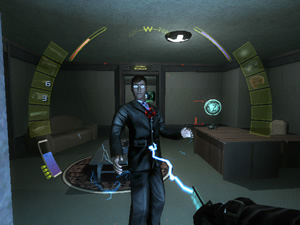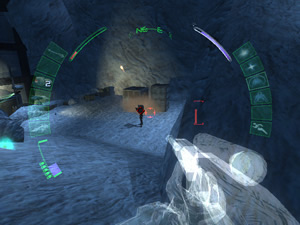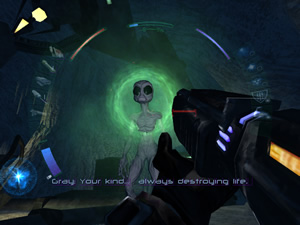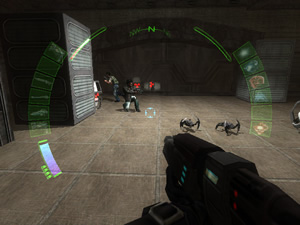The truth is out there.
Do you avoid long phone conversations for fear of unwanted eavesdroppers? Have
John Ashcroft’s Patriot Acts I and II left you afraid to sing your favorite Public
Enemy jams in the shower? Believe the “War on Terror” is in reality an attempt
to ban all slasher films by a conniving cabal of Soccer Moms?
Well,
back in 2000, no game massaged our inner conspiracy-theorist with more care
than Warren Spector’s Deus Ex. The father of such
gems as the Thief and System
Shock series of PC games, Spector’s unique approach to design led to a stellar
game.
But admittedly, it’s a tough act to follow since now we all sort of know what
to expect. The sequel, Deus Ex: Invisible War, continues the
original’s sense of freedom without really expanding on it. Strictly on its
own laurels, the game offers a compelling experience, but when compared to its
expansive forbear, this latest offering comes up several hours short and a bit
shy of technical integrity.
The plot is one of the more neutral points. It’s not bad, but not award-winning,
either. It all begins in 2070, twenty years after your stint as J.C Denton in
the original game. A suicide bomb destroys all of Chicago, including its primary
target, the Tarsus Academy, a facility for gifted youth training to become covert
super-soldiers. You and a few other Tarsus trainees manage to relocate to Seattle
where you learn even more bad news about the blast, leading to your realization
that things are not quite what they seem. The twisting story of corruption,
espionage and terrorism serves its purpose and keeps you entertained.
And nearly right from the outset, the game allows you to choose which side of the fence you want to play on. Do you want to stick with Tarsus, run with the Broodhood terrorist group or go it alone, freelance-style? No matter which path you choose, ultimately you’re free to pick up jobs from various NPCs within certain areas such as Germany, the U.S. and others. The choice is yours!
Customizing your character leads to a refined list of choices from the original
game, but it still opens and closes avenues of gameplay. The Biomod nanotechnology
makes a return and allows you to augment your character with special abilities
such as increased speed, strength, Bot Domination, Cloaking, Regeneration and
many more. In addition, your various weapons can be modified to add scopes,
decrease ammo-consumption, increase range, etc. One notable weapon mod is the
Glass Destabilizer, which quietly and discreetly dissolves windows. Sweet.
 However,
However,
the skill set upgrades are gone, meaning you can no longer divvy out points
to make your guy better with a shotgun or handier with a lockpick. Some will
find this upsetting since it was part of what defined the original Deus
Ex experience; if you chose to perfect your hacking skills, you would
inevitably play the game differently than if you were a rifle-toting brute.
Invisible War is definitely more streamlined, but fans of the
original might miss the depth.
The world is also filled with plenty of people to converse with who can offer valuable information and will help move the game forward. Unfortunately, don’t expect to make any major choices through the conversations, because all choices are made by your actions in the game. This is fine for the most part, but it would be nice to haggle, or plead your case, or insult a rude NPC.
Deus Ex was all about free-form gameplay and multiple solutions
to problems, and this one is no different. You can sneak through levels undetected,
or frag like a maniac, or hack into computer terminals and shut things down,
or snipe from a distance, or, well, you get the point. It’s here where the game
earns its stripes, and very few games can claim the same sort of amazing same-level
replayability.
Invisible War‘s sense of freedom is a bit of a step back
from the original game, though. I can forgive the dumbing down of the skill
system for supposed mass-appeal, but it’s a little harder to forgive the fact
that while the you can choose to turn off lights, or snipe, or take control
of robotic personnel, or any combination of the above, I have yet to find a
problem that could not be avoided or solved by a trip through the proverbial
vent shaft, with which the game is littered.
Invisible War is also littered with the bodies of slain enemies,
because they just aren’t smart at all. Combat is less than rewarding when enemies
show no interest in the fact that they are being perforated, exploded, mauled,
and stabbed. They just stand there and take it like a digital Milton.
The opposition will also storm right at you without any sense of organization
or plans of attack. The death animations are nonexistent as foes just fall over
when they’ve had enough. I just don’t get the feeling these guys are into their
job. Come on! Work for it!
Your work, on the other hand, is handled nicely with good control on both the
PC and the Xbox. The game sort of seems built with both in mind, so you won’t
be fumbling through tons of PC-style menus with the Xbox controller.
 For
For
an invisible war, things do look very nice on both the PC and the Xbox, albeit
not cutting-edge. The game is filled with all sorts of dynamic lighting and
shadows. Metallic surfaces have a pleasant sheen to them and the textures are
solid. The physics system still permits the player to pick up just about anything
and toss it around, but all objects, no matter the size, seem to possess the
same lack of weight and absence of mass.
To beat a dead horse (or game engine), it seems Invisible War
has suffered a blow from Old Man Standardization. While both versions look and
play roughly the same, both also are plagued with similar framerate issues.
Do not expect a smooth or even consistent graphical affair. Maybe all the extra
shadows and dynamic lighting was a bit too much.
I figured I could clean things up a bit in the PC version by slapping an NVIDIA
graphics card in my rig since there is an obnoxious NVIDIA ad that runs during
the game’s startup, but no dice. ATI, NVIDIA, Xbox…it doesn’t matter how you
power it, the game just isn’t optimized well.
But with all that said, Deus Ex: Invisible War is still a
fun game that carries most of the interesting elements from the original. The
ability to explore and choose how you want to approach each obstacle is great,
albeit a bit simpler this time around. It’s also much shorter, clocking in at
around 15 hours, but again, you can play each level in various ways. While it
doesn’t match its lofty past, it does serve up a decent dose of gaming joy.
And that’s the truth.

-
Fun, open-ended game play
-
Good RPG customization
-
Cool graphics
-
Sorta
-
Horrible AI
-
Reduced level of customization











